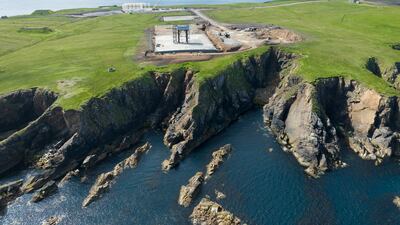A spaceport located at the northern-most tip of Scotland is targeting summer 2024 to host the UK's first vertical rocket launch.
SaxaVord Spaceport on Unst in Shetland has been granted a licence by the Civil Aviation Authority (CAA), granting it permission to host up to 30 launches each year for companies requiring satellites in polar orbit.
The site is the only vertical launch orbital spaceport in Western Europe.
Horizontal launches, as the term suggests, involve spacecraft that take off horizontally like aircraft.
Satellites in polar orbits include those which monitor Earth’s environment, such as remote sensing satellites and some weather satellites, as well as some military surveillance satellites, according to experts.
Scott Hammond, Deputy Chief Executive of SaxaVord Spaceport, told The National next summer should be "achievable" to host the site's first launch.
"I think we will be putting up satellites that will go up and grab old satellites and get them out of orbit so as to decrease space waste," he added.
The site is working with several companies, including Edinburgh-based rocket company Skyrora, in addition to German firms Rocket Factory Augsburg and HyImpulse, as well as Lockheed Martin ABL Space Systems.
"They will come and launch from our site. So we are very much like an airport. So you imagine they are like the Lufthansa or the British Airways coming to fly out of Edinburgh or something like that," said Mr Hammond.
The site is currently testing and exercises to prepare, he said.
The regulator verified that the privately-owned spaceport met the safety and environmental requirements for vertical space launches.
Owned by husband and wife Frank and Debbie Strang, the former RAF base is located on a remote peninsula on Unst.
So far, just under £30 million has been spent on developing the spaceport, which includes three launch pads and a hangar for assembling rockets.
German companies Rocket Factory Augsburg and HyImpulse hope to carry out launches from SaxaVord in 2024.
Tim Johnson, director of space regulation at the CAA, said: "Granting SaxaVord their licence is an era-defining moment for the UK space sector.
SaxaVord spaceport - in pictures
"This marks the beginning of a new chapter for UK space as rockets may soon launch satellites into orbit from Scotland.
"We are undertaking vital work to make sure the UK's space activities are safe and sustainable for all."
Mr Strang said the award of the licence is "historic", adding: "Our team is very proud that the government has entrusted us with operating a complex, multi-disciplinary and multi-launch spaceport, and we all take this responsibility very seriously.
"There is much to do still but this is a fantastic way to end the year and head into Christmas."
He and his wife took over the former RAF base in 2004. They also have plans for a hotel and visitor centre at SaxaVord.
Both the UK and Scottish governments welcomed the news of the licence.
UK Transport Secretary Mark Harper said: "The United Kingdom's space industry is growing, with SaxaVord set for lift-off to become this country's first vertical spaceport.
"Today's historic announcement will boost Shetland's economy and put the United Kingdom at the forefront of spaceflight innovation."
The Scottish Government's Innovation Minister Richard Lochhead said: "This milestone heralds a new era for space in Scotland.
"As the UK's first licensed vertical spaceport, SaxaVord and Scotland can soon be a gateway to space, deploying cutting-edge small satellites into orbit for international and domestic customers alike."
While Spaceport Cornwall became the UK's first licensed spaceport, SaxaVord's licence allows it to host vertical launches rather than horizontal launches of rockets carried by aircraft.
A launch from the site in Cornwall ended in failure in January, after a problem with a fuel filter during the flight led to the loss of the nine small satellites the LauncherOne rocket was carrying. The company behind the mission, Virgin Orbit, has since filed for bankruptcy.
But Spaceport Cornwall has said it is continuing to "operate as a multi-user site with demand for launch rising globally set against the backdrop of a lack of launch sites".







